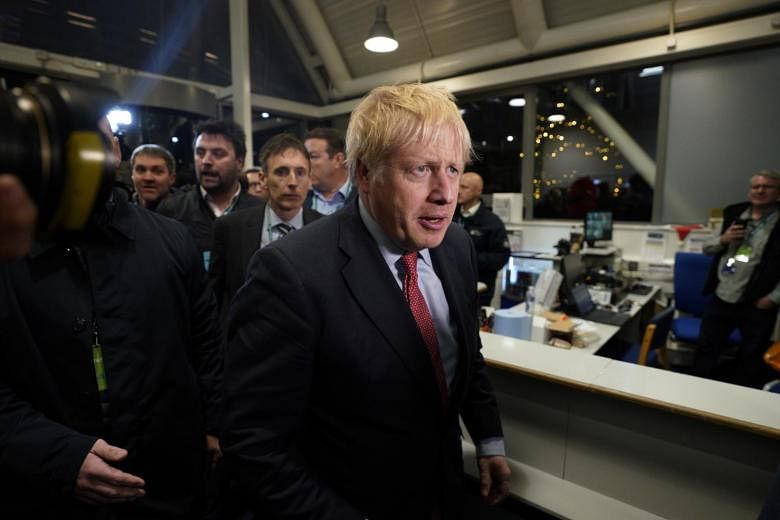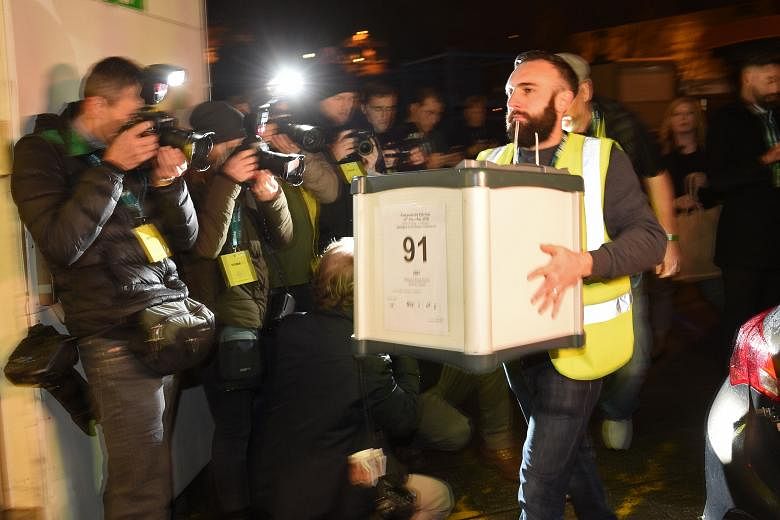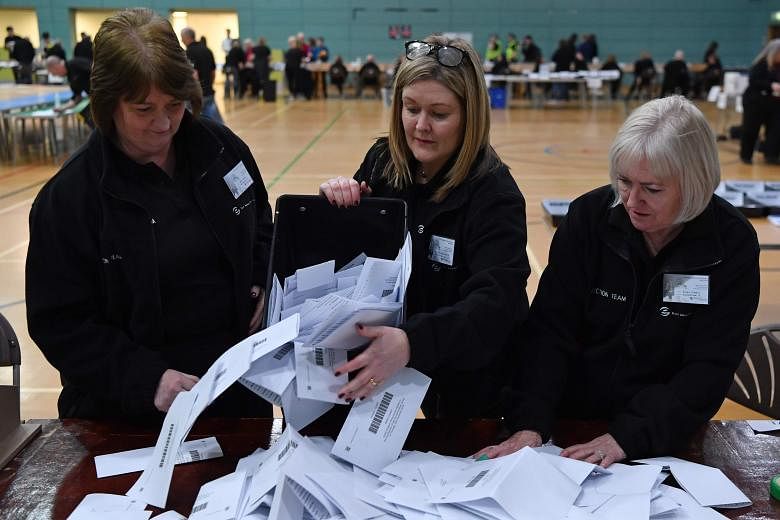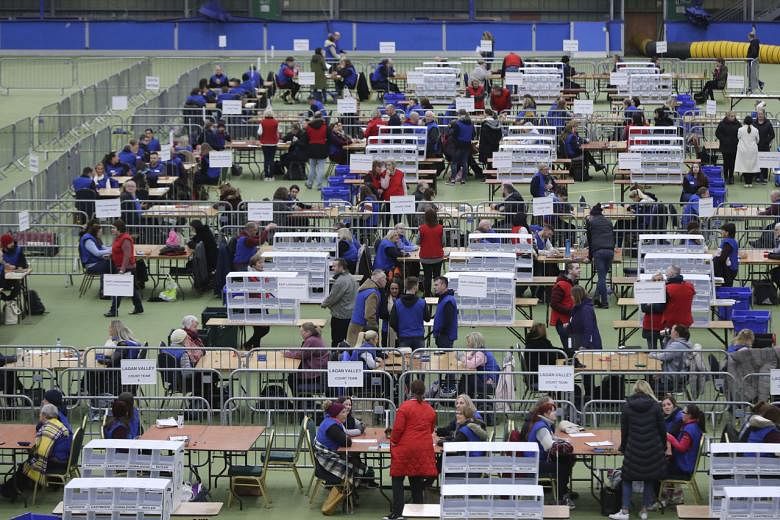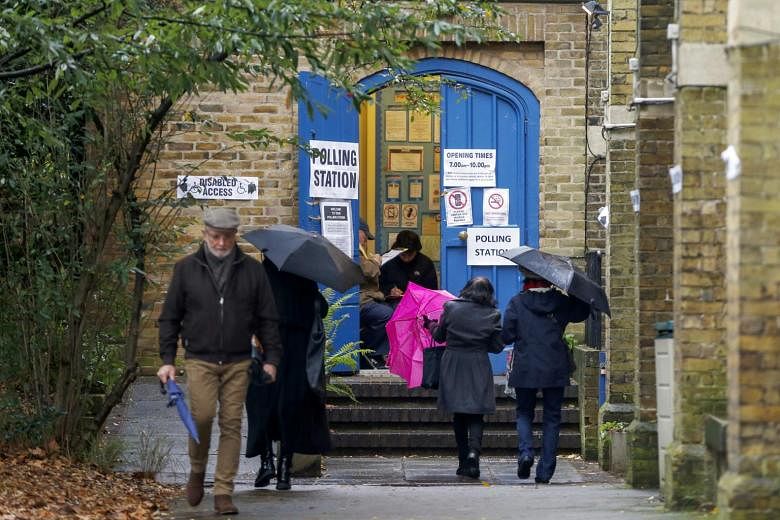LONDON (REUTERS, BLOOMBERG, AP, WASHINGTON POST, AFP) - Prime Minister Boris Johnson's Conservative Party has won an outright majority in Britain's election, taking 364 seats so far even as votes were being counted in other constituencies, according to the ITV television channel.
The majority gives Mr Johnson the numbers in Parliament he needs to deliver Brexit on Jan 31 and are in line with the predictions of an exit poll.
Results have come in for 649 seats out of the total of 650, and the Conservatives are expected to have a majority of 78, reported the BBC.
Speaking after he was re-elected in his seat of Uxbridge and South Ruislip, Mr Johnson said the general election result would deliver a "powerful new mandate" to a "one-nation Conservative government".
"It does look as though this one-nation Conservative government has been given a powerful new mandate - to get Brexit done, unite this country and take it forward," he added.
He said he thought it has "turned out to be an historic election that gives us now, in this new government, the chance to respect the democratic will of the British people to change this country for the better and to unleash the potential of the entire people of this country".
At a victory rally in early hours of Friday, Mr Johnson paid tribute to colleagues who lost their seats, but noted this was the biggest majority for the party since the 1980s.
He asserted that his party would now get on with the job of getting Brexit done as the "irrefutable, inarguable" decision of the British people.
Mr Johnson also said the victory has ended the threat of a second referendum.
The British Prime Minister said he was humbled by people who had switched support to the Tories, "and I and we will never take your support for granted".
He drew a red line under Jan 31 as the date for Brexit, "no ifs, no buts, no maybes".
With results in from almost all 650 parliamentary seats, the Conservatives had won 364, their biggest election win since Mrs Margaret Thatcher's 1987 triumph.
Labour, led since 2015 by the veteran socialist Jeremy Corbyn, had won just 203 seats, the party's worst result since 1935, the Scottish National Party (SNP) 48 seats and the Liberal Democrats 11.
Brexit has redrawn the political map of the country, but few people predicted just by how much in this election.
Former industrial areas of northern England and Wales abandoned Labour for the first time in generations, with mining and steel towns that suffered from mass unemployment under the Conservatives in the 1980s now embracing the party.
Scotland, which opposed Brexit, staged a rebellion as the SNP retook seats it lost two years ago.
Polls closed at 10pm on Thursday (Dec 12) in the UK as Britons who have endured more than three years of wrangling over their country's messy divorce from the EU cast ballots in an election billed as a way out of the Brexit stalemate in this deeply divided nation.
Some 46 million people were eligible to vote in the country's first December election since 1923.
Mr Johnson was hoping to win a majority of the 650 seats in the House of Commons so he can lead the UK out of the EU on Jan 31 as promised.
The main opposition Labour Party, led by Mr Corbyn, had promised a new referendum on Brexit.
On Thursday night, Mr Johnson told party members to "enjoy a celebration" after the exit poll forecast gave him the numbers in Parliament he needs to deliver Brexit next month.
"I hope you enjoy a celebration tonight," he said in an e-mail to party members. "You powered this campaign. We couldn't have done it without you."
Mr Johnson retained his seat in Uxbridge and South Ruislip constituency by increasing his nominal vote to 25,351 from 23,716 in 2017.
Meanwhile, Mr Corbyn also won in his Islington North constituency. But Labour figures called for Mr Corbyn to step down.
He duly did so in his acceptance speech after holding his seat. Two officials, speaking on condition of anonymity, said there was no way he could carry on.
"Tonight is an absolute disaster for the Labour Party," Mr Ian Murray, Labour lawmaker for Edinburgh South, told the BBC.
"There has got to be a change of direction. That work either has to start tomorrow or the Labour Party has to reassess what it stands for."
"We have a chance now to bring this whole thing to an end, get Brexit done, get that trade deal we talked about, finish it all off," former Conservative leader and Brexit hardliner Iain Duncan Smith told Sky News.
"If it was anyone else, we would have been meandering along for another six months to a year, with no decisive result."
Labour Party shadow finance minister John McDonnell blamed public disaffection with the protracted Brexit process for the predicted heavy election defeat.
"It looks as if Brexit dominated. A lot of this was Brexit fatigue. People just wanted it over and done with," he told Sky News.
US President Donald Trump reacted to the poll results on Twitter. "Congratulations to Boris Johnson on his great WIN! Britain and the United States will now be free to strike a massive new Trade Deal after BREXIT. This deal has the potential to be far bigger and more lucrative than any deal that could be made with the E.U. Celebrate Boris!" he tweeted.
The sterling surged more than 2 per cent to a 2019 high against the dollar on the exit poll prediction. The pound soared to US$1.3476, up 2.2 per cent after the exit poll release. The currency also rallied 2 per cent against the euro to 82.85 pence.
On a dank, gray day with outbreaks of blustery rain, voters went to polling stations in schools, community centres, pubs and town halls after a five-week campaign rife with mudslinging and misinformation.
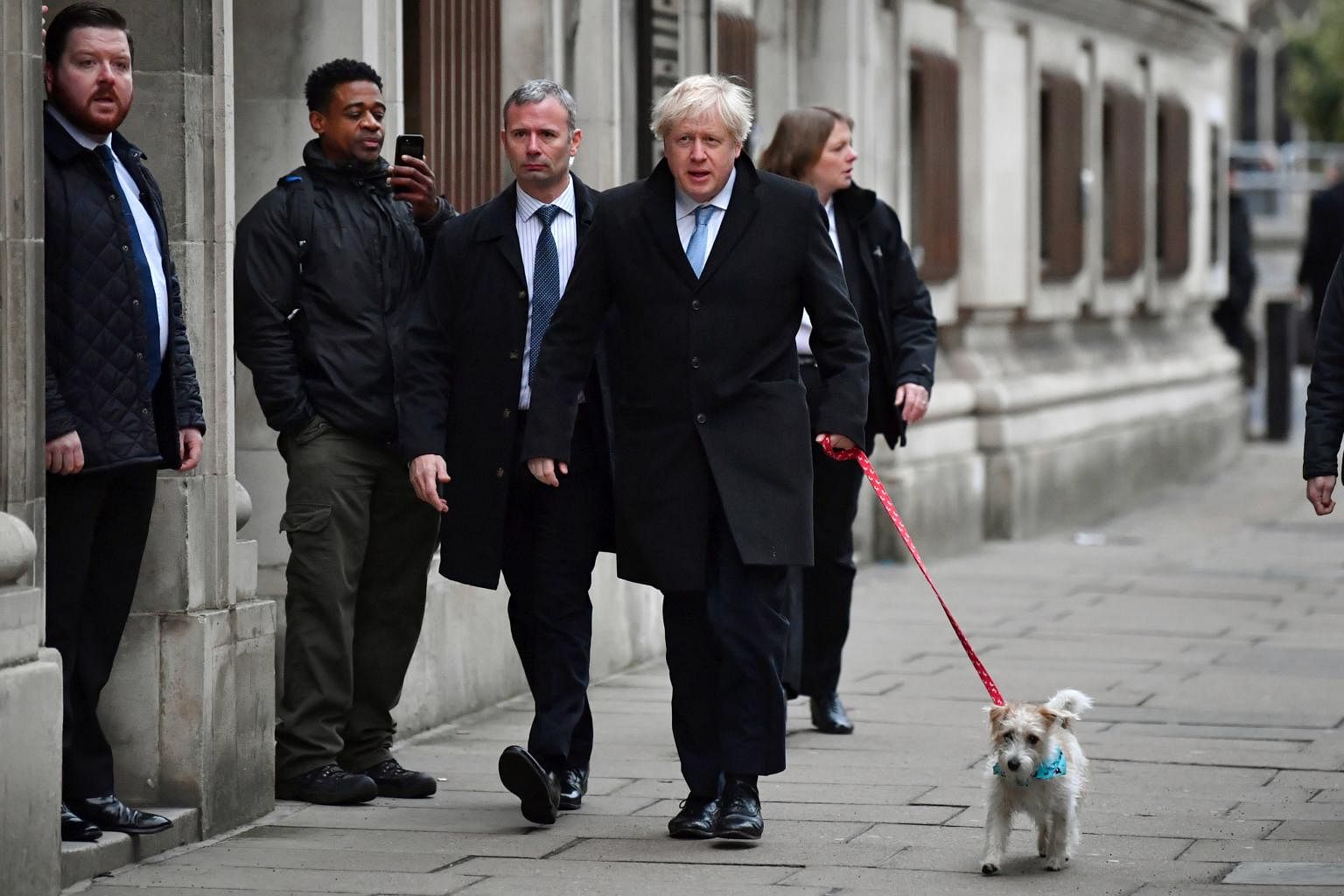
At a fish market in the eastern England port of Grimsby, seafood company owner Nathan Godley summed up the hopes of many that - one way or another - the election would provide a pathway to a resolution of Brexit.
"I think we all got a bit weary of the politicians over the last few years really, and I think having a government with a majority to give them the clout to actually do what they want is a good thing," he said.
Ms Sarah Duncan, 71, a historian and a lifelong Conservative voter, was up first thing to go to her London polling station, not far from the River Thames.
She said this election "was particularly important, because I'm very frightened of far-left wing government and what Jeremy Corbyn could do for this country".
Ms Duncan confessed that in the June 2016 referendum, "I voted to stay, I didn't vote for Brexit, but I do feel that because the country has voted for Brexit, it's a democratic country, and we should do what the majority said and we should leave, and that's what Boris stands for".
As a leader, she said, "he hasn't had a chance to prove himself yet. We will wait and see".
Mr Nick Symes, 53, a yacht broker, standing in the rain, said he voted for the Labour Party because, "it's socialist, it's why I like it, it's redistributive, and it's not Boris Johnson".
Mr Josh Hawketts, 27, an underwriter, voted Labour in his constituency in Battersea, south-west London. Standing outside a polling station just before sunrise, he explained that his vote was "not for Corbyn or anything like that, it was purely tactical. Just anti-Tory, basically".
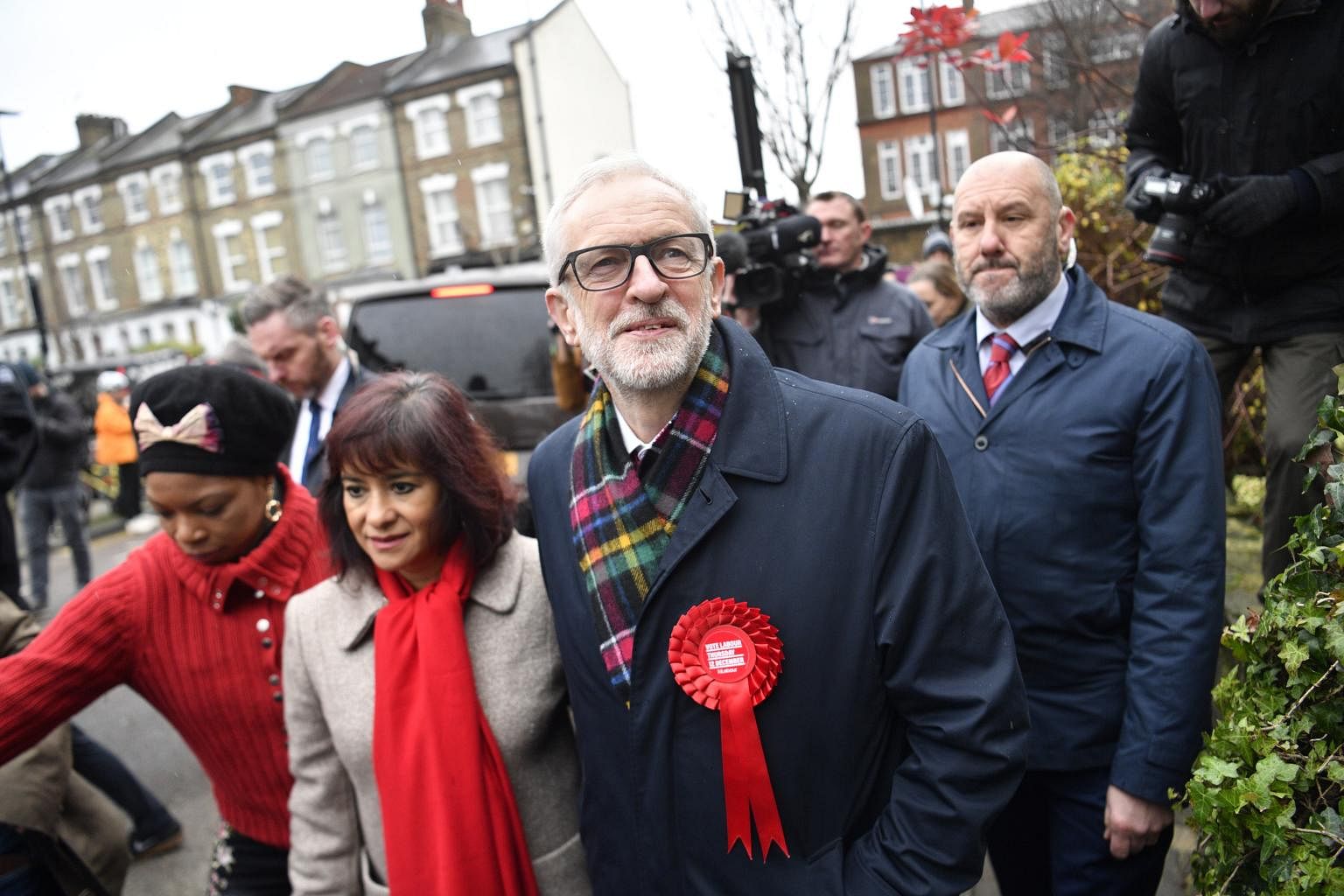
He said that he was anti-Tory "primarily because of Brexit, but there are other things, austerity over last nine years, underfunding".
Mr Johnson voted near the prime minister's Downing Street residence in London, accompanied by his dog, Dilyn.
Mr Corbyn was greeted by supporters and an activist dressed as Elmo from Sesame Street as he arrived to vote in his north London constituency.
The two parties offered voters starkly different visions of the future.
Mr Johnson campaigned relentlessly on a promise to "Get Brexit done" - and promised a modest increase in public spending - while Labour vowed to tax the rich, nationalise industries such as railroads and water companies, and give everyone in the country free Internet access.
On Brexit, Labour said it would negotiate a new divorce deal with the EU and then offer voters the choice of leaving the 28-nation bloc on those terms or remaining.
The Prime Minister pushed for this early election to try to break a logjam in Parliament that stalled approval of his Brexit agreement.
He had said that if he wins a majority, he will get Parliament to ratify his "oven-ready" divorce deal with the EU and take Britain out of the bloc as scheduled on Jan 31.
The Conservatives had focused much energy on trying to win in a "red wall" of working-class towns in central and northern England that have elected Labour lawmakers for decades, but also voted strongly in 2016 to leave the EU.
The Conservatives also have been helped by the Brexit Party led by Mr Nigel Farage, which decided at the last minute not to contest 317 Conservative-held seats to avoid splitting the pro-Brexit vote.
Labour, which is largely but ambiguously pro-EU, faced competition for anti-Brexit voters from the centrist Liberal Democrats, the Scottish and Welsh nationalist parties, and the Greens.
It has tried to focus the campaign on the plight of the National Health Service, a deeply respected institution that has struggled to meet rising demand after nine years of austerity under Conservative-led governments.
One of the campaign's defining images was a photo of a sick four-year-old boy sleeping on a hospital floor because no beds were available.
Mr Johnson's initial failure to even look at the photo put him on the defensive, portraying him as insensitive to the child's plight.
The photo, initially published by the Yorkshire Evening Post, swept across social media like a firestorm in the final days of the campaign.
For many voters, the election offered an unpalatable choice. Both Mr Johnson and Mr Corbyn have personal approval ratings in negative territory, and both have been dogged by questions about their character.
Mr Johnson has been confronted by his past broken promises, lies and offensive statements, from calling the children of single mothers "ignorant, aggressive and illegitimate" to comparing Muslim women who wear face-covering veils to "letter boxes".
In Uxbridge, Mr Stefan Hay said he was voting for the prime minister despite his flaws.
"At the end of the day, whether you like him or not, with all of his eccentricities, I think he has leadership ability and I think he is the best man for the job, simple as that," Mr Hay said.
Mr Corbyn has been accused of allowing anti-Semitism to spread within the party.
The 70-year-old left-winger is portrayed by opponents as an ageing Marxist with unsavoury past associations with Hamas and the IRA.
But many voters said they were backing Labour because of its stance on social issues.
"If the Tories win, this country will just fall apart," said Ms Eleanor Sawbridge Burton, a freelance writer in London. "It will really hit climate change and the NHS. It feels a bit hopeless."
With so much at stake, political parties had pushed the boundaries of truth, transparency and reality during five weeks of campaigning.
Social media platforms were a critical battleground, as the parties bombarded voters with messages - many of them misleading.
The Conservatives, in particular, were criticised for using underhanded tactics on social media.
The party circulated a doctored video that made it look as if an opposition leader had been stumped when asked about his position on Brexit.
Then during a TV debate, the party re-branded its press office Twitter account as a fact-checking service.
Labour also sought to co-opt the role of independent fact-checker, rolling out a website called The Insider, which urged voters to "trust the facts".
Dr Rasmus Kleis Nielsen, director of the Reuters Institute for the Study of Journalism at the University of Oxford, said the digital campaign showed that the political landscape had changed.
"You don't get more establishment than the British Conservative Party," Dr Nielsen said. "If that is what they see as fit and proper, we must confront the fact that this is the new normal."
